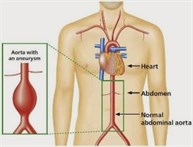More information is available on the visiting page
Abdominal Aortic Aneurysm (AAA) Screening
What is an aneurysm?
The aorta is the main blood vessel that supplies blood to the body. It runs from the heart down through the chest and abdomen.
In some people, as they get older, the wall of the aorta in the abdomen can become weak. It can then start to expand and form what is called an abdominal aortic aneurysm, also known as an AAA or 'triple A'. The condition is most common among men aged 65 and over.
Large aneurysms are rare but can be very serious. As the wall of the aorta stretches it becomes weaker and can burst. This is known as aneurysm rupture and is usually fatal. A smaller aneurysm is not dangerous. However, aneurysms can grow and it is important to monitor their size.

The condition is particularly serious because it does not have any symptoms. However, treatment for abdominal aortic aneurysms detected through screening is highly effective.
About AAA screening programme
The implementation of the NHS Abdominal Aortic Aneurysm (AAA) Screening Programme follows evidence that shows it should prevent premature deaths from ruptured aneurysms through early detection, appropriate monitoring and treatment.
When will I be called for screening?
The AAA Screening Programme invites all men for screening during the year they turn 65 (they must be registered with a GP).
Men aged over 65 who have not previously been screened can self-refer for screening by contacting our office on 01905 733830 (direct line)
Men who have an aneurysm detected through screening are offered regular monitoring or treatment depending on the size of the aneurysm.
We do not screen women as men are six times more likely to develop the condition than a woman.
For more information
Call the AAA Screening office on 01905 733830.
Visit the NHS Abdominal Aortic Aneurysm Screening Programme website.

